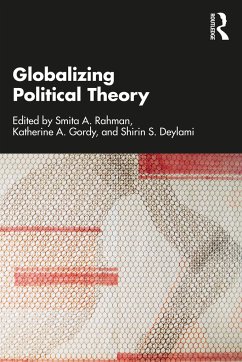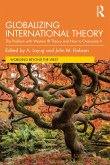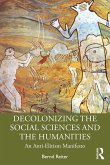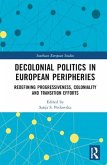Globalizing Political Theory is guided by the need to understand political theory as deeply embedded in local networks of power, identity, and structure, and to examine how these networks converge and diverge with the global. With the help of this book, students of political theory no longer need to learn about ideas in a vacuum with little or no attention paid to how such ideas are responses to varying local political problems in different places, times, and contexts.
Key features include:
Central Conceptual Framework: Introducing readers to what it means to "globalize" political theory and to move beyond the traditional western canon and actively engage with a multiplicity of perspectives.Organization: Focused on key topics essential for an introductory class aimed at both globalizing political theory and showing how political theory itself is a globalizing activity.Themes: Colonialism and Empire; Gender and Sexuality; Religion and Secularism; Marxism, Socialism, and Globalization; Democracy and Protest; and Race, Ethnicity, and Indigeneity.Pedagogy: Each chapter features theoretical concepts and definitions, political and historical context, key authors and biographical context, textual evidence and exegesis from the foundational texts in that thematic area, a list of discussion questions, and a list of resources for further reading.
Committed to a multiplicity of perspectives and an active engagement between the global and the local, Globalizing Political Theory connects directly with undergraduate and graduate-level courses in political theory, global political theory, and non-western political thought.
Key features include:
Central Conceptual Framework: Introducing readers to what it means to "globalize" political theory and to move beyond the traditional western canon and actively engage with a multiplicity of perspectives.Organization: Focused on key topics essential for an introductory class aimed at both globalizing political theory and showing how political theory itself is a globalizing activity.Themes: Colonialism and Empire; Gender and Sexuality; Religion and Secularism; Marxism, Socialism, and Globalization; Democracy and Protest; and Race, Ethnicity, and Indigeneity.Pedagogy: Each chapter features theoretical concepts and definitions, political and historical context, key authors and biographical context, textual evidence and exegesis from the foundational texts in that thematic area, a list of discussion questions, and a list of resources for further reading.
Committed to a multiplicity of perspectives and an active engagement between the global and the local, Globalizing Political Theory connects directly with undergraduate and graduate-level courses in political theory, global political theory, and non-western political thought.
"Globalizing Political Theory is a timely and rigorous volume that effectively deprovincializes intellectual histories of political thought. The editors have curated engaging conversations across time and space that show how thinkers responding to differing local contexts produced ideas and concepts that resonate beyond them."
Juliet Hooker, Professor of Political Science, Brown University
"Among the most urgent missions of political theory today is to deepen its engagement with forms of thought, knowledge, and imagination beyond the Western canon. Scholars have now been doing this in greater numbers and with greater rigor for almost two decades. But debates still persist about the most urgent priorities for this mission, and the most appropriate methods and tools. This volume is an outstanding introduction to these debates for an undergraduate or graduate level, with chapters by some of the top emerging scholars working in non-Western and decolonial thought."
Andrew F. March, Professor of Political Science, University of Massachusetts, Amherst
"Like it or not, political theory has always been global. From excavating unrecognized prehistory to plumbing contemporary transnational resonances, this essential volume brings to light what is so often hidden, and in so doing helps craft a political theory made to the measure of the world."
George Maher, Visiting Associate Professor of Global Political Thought, Vassar College
"This volume offers new perspectives on a range of familiar political issues, from a range of modern thinkers from across the world. It will definitely disrupt business-as-usual in the teaching and practice of political theory."
Leigh K. Jenco, Professor of Political Theory London School of Economics and Political Science
Juliet Hooker, Professor of Political Science, Brown University
"Among the most urgent missions of political theory today is to deepen its engagement with forms of thought, knowledge, and imagination beyond the Western canon. Scholars have now been doing this in greater numbers and with greater rigor for almost two decades. But debates still persist about the most urgent priorities for this mission, and the most appropriate methods and tools. This volume is an outstanding introduction to these debates for an undergraduate or graduate level, with chapters by some of the top emerging scholars working in non-Western and decolonial thought."
Andrew F. March, Professor of Political Science, University of Massachusetts, Amherst
"Like it or not, political theory has always been global. From excavating unrecognized prehistory to plumbing contemporary transnational resonances, this essential volume brings to light what is so often hidden, and in so doing helps craft a political theory made to the measure of the world."
George Maher, Visiting Associate Professor of Global Political Thought, Vassar College
"This volume offers new perspectives on a range of familiar political issues, from a range of modern thinkers from across the world. It will definitely disrupt business-as-usual in the teaching and practice of political theory."
Leigh K. Jenco, Professor of Political Theory London School of Economics and Political Science









